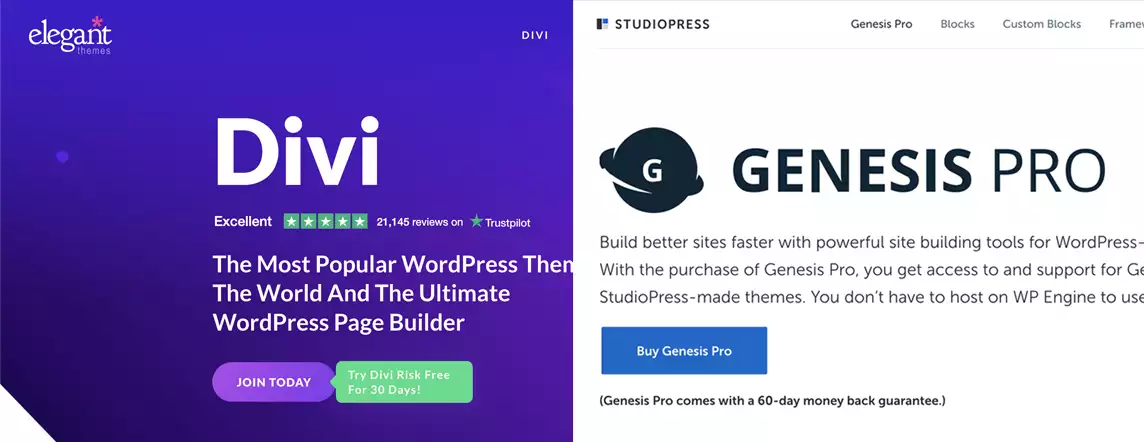Divi vs. Genesis : The Best WordPress PageBuilder Theme
Paying for a web developer to build your website for you might seem like the way to go if you're not tech-savvy, but in reality, a lot can go wrong when you go that route. Things get lost in translation, the price tag to have someone else build your website is often extreme, and you might not wind up with a final product that you're 100% satisfied with for months or even years.
Choosing to build your website using a builder like Divi or Genesis could be an excellent option for you, even if you're brand new to website building and management. Both Divi and Genesis utilize the WordPress framework, which is the most popular website framework in the world. Both Divi and Genesis have a lot to offer, but which one is best for you? Let's find out.
What is Divi?
Divi Builder is a visual content editor that works in a drag-and-drop format. Divi went from a back-end page building tool to a front-end visual content editor in its most recent upgrade. This upgrade changes how you can use Divi and creates a more user-friendly overall application for the builder.
Building and Design Features
Not only does Divi give users the opportunity to build their pages from scratch to fit the design aesthetic of their business into the website, but it also has a growing number of pre-made themes and layouts available. You don't have to be a designer or have a great eye to make Divi work for you, and in that way, it's friendly to all kinds of people at various skill levels.
Testing Features
Divi Builder has a phenomenal A/B Lead testing tool that allows you to test different content variations or designs on your site to see, which leads to more conversions. It's not always easy to tell which design or content changes will lead to more business for you, but you'll know before committing to a change with this excellent tool.
ECommerce Features
Divi Builder is WooCommerce compatible, which is highly desirable, especially for those new to website building. WooCommerce is probably the most popular ecommerce platform available, especially on WordPress. It creates a virtual storefront hassle-free and straightforward, just another user-friendly notch in Divi's belt.
Support Features
Divi Builder has a ton of support options to help you find what you need without having to call or text in to create a support ticket. If you do end up in a situation where you have to speak directly to a support professional at Divi, then you might end up waiting longer than you'd like. Luckily, you can find answers to most questions and problems via other options.
Some of the support options available with Divi are as follows:
- Detailed documentation
- Messenger support
- Facebook groups
Pros: What We Like About Divi
Divi has a lot to offer, especially with its recent updates within the last year or so. The folks at Divi are consistently pumping out new elements, themes, and products to increase both the user-friendliness and overall options available with this page builder.
- The lifetime pricing option includes all themes and the builder to give you unlimited access to all of this website builder's fantastic features for as long as you're using WordPress.
- A website builder for anyone from professionals to brand new entrepreneurs looking to save money by building their website.
- The Divi Page Builder supports WooCommerce for easy ecommerce conversions.
- Options to develop pages and themes from scratch or utilize pre-built options in a mix and match style or as a single theme.
- You can utilize the page builder plug-in with any theme, even those that aren't associated with Divi or ElegantThemes.
- Divi 4.0 includes a theme builder to customize every possible aspect of your website, regardless of your theme.
- All Divi Builder themes are fully responsive and utilize easy to use drag-and-drop visual content editing.
Cons: What to Consider About Divi
Like everything, Divi has some points of contention with users. Although the page builder has a lot to offer, it isn't perfect. Here are some things to consider before you purchase Divi.
- The number of features and options can be overwhelming at first and create a big learning curve.
- Support isn't always as accessible as you would like when you need to speak to them directly. It takes some time to hear back.
- If you ever decide to leave Divi to work in a different theme or with a different page builder, you may find it challenging to convert pages due to Divi's shortcode in pages as you build.
What is Genesis?
The Genesis Framework is a back-end page builder and theme design tool that allows users to either access its vast array of pre-built themes or build pages and themes of their own utilizing the framework's user-friendly tools. Genesis Framework exists on its own behind the scenes of any themes that StudioPress creates.
StudioPress is a highly regarded company that will be around for a long time, so it offers peace of mind to Genesis users that their support system and new themes will continue to come out for a long time to come.
Building and Design Features
Genesis Framework offers a wide range of pre-built themes that you can use and which come with helpful instructions on how to install the theme with ease. You can also design your pages or themes, but doing so requires a bit more coding knowledge than your average WordPress user likely has in their roster.
Marketing Features
The SEO features users highly regard available standards with the Genesis Framework because of their proven effectiveness. You can disable the SEO features to add those from outside plug-ins if the features that come with Genesis don't suit your needs, but that's unlikely.
ECommerce Features
Since the Genesis Framework has very few overall features and add-ons, the ecommerce features of this framework will depend mainly on the child-theme you choose or your coding skills. StudioPress didn't set Genesis up to work directly with any single ecommerce plug-in or framework, but some themes will utilize WooCommerce or other ecommerce platforms in their design.
Support Features
Support is something you'll find mostly available from community members using the community forums or Facebook groups versus submitting a support ticket. Genesis doesn't have real-time support, so you could wait between 24 and 48 hours to have Genesis respond to your needs if you opt for the support ticket option versus looking through or posting on the community forum.
Pros: What We Like About Genesis
There's a lot to love about the Genesis Framework. It offers options and features that you can't find on other pages or theme builders on WordPress. Here are some of our favorite things about Genesis:
- Each theme comes with detailed instructions for setting up your website so that you're less likely to run into trouble along the way.
- Genesis Framework is developer-friendly in a lot of ways, including its coding and simple hooks.
- Genesis is an excellent value for the money since you can buy the framework and themes separately or together for a single, lifetime price
- Users highly regard the SEO credentials of Genesis, and, as a bonus, you can deactivate them to install other SEO plug-ins if those that come with Genesis don't fit your needs.
- Compatible with third-party products and features that can add additional customization options to your Genesis Framework.
- There are always new themes coming out for the Genesis Framework from the good folks at Studio Press.
- Fewer features and add-ons mean faster loading times for most Genesis child-themes.
Cons: What to Consider About Genesis
Genesis has many options and features exciting for users of all shapes and sizes, but it lacks in some vital areas. Here's a look at some of the areas you might want to question before officially deciding to opt for this framework:
- Support comes mostly in the form of community forums. Opting to open a support ticket could mean waiting 24 to 48 hours for a response, which is often far too long in this fast-paced world.
- Genesis doesn't come with too many customization options for its existing themes. Although you can build your themes and pages, customizing existing themes is far more difficult, especially for inexperienced users.
- Although Genesis is easy to set up due to its focused themes, it lacks other page builders' features and uses.
- This framework is well suited to professionals and developers but might not be user-friendly and straightforward for the average WordPress user.
Comparing Divi and Genesis Side-by-Side
Divi Builder and the Genesis Framework both offer tons of pre-made templates and great basics for new users to utilize while building their first website. These builders also have lots of features that make them great options for developers looking to utilize the same basic framework and even similar page designs on multiple websites.
Despite their similarities, some pretty extreme differences between these two-page builders will change which type of WordPress users should use them and how they might choose to do so.
Ease of Use and Learning
From a new user standpoint, both Divi and Genesis offer simple, pre-built themes that you can install to do the work of creating your first website.
Divi doesn't have as many focused themes like Genesis, meaning you'll have to choose based on an overall aesthetic or features versus simply finding a pre-made restaurant theme, for instance. Instead, Divi gives you general themes and lots of customization options to make them your own with their drag-and-drop builder. You can even see the changes in real-time.
Genesis is the opposite. It features a wide array of very specific theme options that focus on different industries and needs like restaurants, law offices, creatives, and more. The downside to Genesis is that you can't edit and customize to the extent that you'd be able to on Divi once you choose your theme. Instead, you're all but stuck with the theme as-is unless you know code.
Regarding learning, Genesis themes come with instructions to help you install them and utilize them with ease. Divi themes require you to take the lead in utilizing the themes. Both of these page builders do a great job of hooking new users up with community forums and information, but neither offers real-time support, so you rely on fellow users to learn the basics.
Arguably Divi is easier to use for the average WordPress user because that person probably knows some, but not enough to develop websites from scratch. Genesis is ideal for brand new users who have never seen the back end of a website before because of the simplicity of their focused themes. Developers would likely be happy with either option.
Workflow Process
Divi is all about drag-and-drop customizations on the front end. It's about making your site into exactly what you want with every possible feature and add-on at your fingertips. It's simple to use, and the user interface is seamless, classy, and not too busy.
With Genesis, you'll work mainly on the back end. You can't see your changes in real-time, and you can't test your changes against the original layout or features as you can do in Genesis. You'll also work more with the code to make significant changes. Otherwise, you'll only be adding your content, which makes the workflow relatively unexciting and straightforward.
Overall we'd say that Divi has a better workflow process because it allows you to see your changes immediately and to test variations before you commit. Doing things this way will enable you to feel more in control of your website than you could with Genesis.
Design Features
Divi Builder has just about every design feature that you could want in a theme builder. Their typography options, colors, backgrounds, gradients, boxes, shapes, and more are almost unbeatable. You can truly customize every single element of your theme or website with the design options available on Divi.
Genesis has far fewer design features built into the framework. If you want to make design changes through Genesis, you'll need to understand code to a much greater extent than with Divi. Typically you will have a few colors and fonts to choose from depending on your theme choice, but overall your options are severely limited compared to Divi.
Pricing
You can buy yearly access to Divi for $89 per year, or you can pay a one-time fee of $224 and receive lifetime access. Either way, you'll get unlimited websites, premium support, and product updates, but lifetime access is a much better deal if you're certain you'll love working with Divi. Although there is no trial period, Divi does offer a 30-day money-back guarantee.
If you'd like the Genesis Framework, then you can buy it with a theme package for $59.95 on average. That will give you access to the full framework, but only the theme package you chose to purchase, but it does give you lifetime access from the start. If you'd like access to the widest variety of themes under the Genesis Framework for life, then you'll pay $360 for Genesis Pro.
Upgrading to Genesis Pro gives you live chat support, all StudioPress Themes, the Genesis Framework, and unlimited sites. It's a much better deal for developers than the other Genesis option.
Since StudioPress is such a highly rated and reputable company with a wide variety of themes already on the market and even more coming out daily, we think that the better value for the price is Genesis Pro over Divi.
Search Engine Optimization and Blogging
Genesis has a great, global SEO package built-in that is easy to use for every WordPress user from beginner to professional. If you are a professional or understand code, you can also override some of the SEO settings on individual pages or posts if necessary.
Divi themes come with a lot of extra code that can bloat your site and slow downloading speeds, negatively impacting SEO. There are many more options to increase your SEO with Divi, but you may find them more challenging to understand than the simple and straightforward SEO package that Genesis offers.
Regarding blogging, both page builders allow you to choose a pre-built theme that revolves around blogging, and both allow you to add blog posts in other theme formats as well. Where Divi takes the lead, here are its options for customizing things like fonts, colors, graphics, page appearance, etc. Genesis simply doesn't have the customization options that Divi does.
When it comes to blogging, customization is vital to set you apart from the crowd. There is an astronomical number of blogs online, and there's likely at least a few that are similar to your website. Finding a way to set your blog apart with its look and features is a great way to entice more followers.
Which Page Builder is Best?
Divi and Genesis each have their benefits, and each will suit different people for various reasons. Let's look at who we believe would find more success with Divi and who would find happiness with Genesis.
Best for Small Budgets
If your budget is small, likely you're a newbie to the world of website building anyway. In this case, we would recommend Genesis because you can opt for the single theme packages that will only average a little under $60 for a lifetime of use.
You can definitely upgrade to Pro or choose Divi if you'd like, but if you're hoping to build a single website with a specific focus, Genesis is by far the less expensive and more straightforward option.
Best for ECommerce
Since Divi comes with WooCommerce built-in regardless of its theme, it is our number one choice for ecommerce websites. You can customize your ecommerce section as well so that it's not a generic virtual storefront like those you'll typically find in retail-focused themes.
Genesis offers ecommerce-focused themes, but choosing one will likely leave you without the ability to customize your site's look, and that might lead to fewer conversions depending on your target audience. It can also be a blessing for people who are brand new to website building, though, so make sure you think through which is more important to you before choosing.
Best for Advanced or Complex Builds
Advanced users and developers will likely enjoy the benefits of both Divi and Genesis. Still, we think Divi offers more to non-professionals in terms of the complex or advanced website or page builds. Although there is a learning curve with all of Divi's options and features, it's far less than the learning curve to understand code that you'd need to use Genesis for the same builds.
Divi offers a massive variety of pre-made themes that feature complexities that few Genesis themes support, making it even more ideal for users looking for very intricate page designs or structures.
Best for Support
We are giving the support award to Genesis only because of the Genesis Pro option. If Genesis Pro didn't provide real-time chat support, then these two page builders would've tied in this category, but the real-time chat pushes Genesis over the edge.
Of course, if you're opting for the theme package options with Genesis, then you'll find that the support for Divi is about the same, and that shouldn't be a significant consideration when you're deciding between the two builders.
FAQs
Why do I need a WordPress page builder?
There are several reasons you'll want to choose a page builder over merely choosing a free theme and running with the general WordPress customization options. First, your website's design is a massive piece of the puzzle of getting it noticed over other websites. Unless you know HTML or CSS, you need to choose a website builder to help you customize your theme and set yourself apart from the crowd.
Second, the WordPress Editor is a very basic version of a page builder and won't give you all of the options that you might want or need to customize your website. It provides only basic SEO options and a few fonts and colors versus builders like Divi, where almost every element of your website is fully customizable. Finally, you'll get access to more specific support and more themes with a page builder than you will with the basic WordPress Builder option, and that's a huge plus, especially when you're just starting out.
What should I consider when choosing a page builder?
First and foremost, you should always consider your budget when you are looking for a page builder. Some builders are so massive and pricey that they aren't going to work well for the average WordPress user. Many builders have pricing options that can help you utilize them within your budget, regardless of your budget.
For instance, the yearly or lifetime Divi options give you two different price ranges for using their products. The same is true for the Genesis Framework buying options. It would be best if you also considered your individual needs. Do you need a visual interface? Do you need drag-and-drop functionality? Are you planning to use this page builder for a single site or for multiple projects? Look to the future, determine what you think you will need in a page builder, and then look for one that most closely matches those needs.
How much research should I do before choosing a page builder?
We recommend doing your due diligence before you choose a page builder to fit your needs. You'd be doing yourself a disservice by only looking at the basics. If any of the page builders you're interested in offer free trials, then we recommend taking advantage to see if you like that builder and test its user-friendliness. If you're looking at page builders like Divi and Genesis that don't offer free trials, then read over lots of reviews on their webpages to ensure that you're getting the best features for your dollar and that you're getting the support you need.
If you're looking for a set amount of time, then we'd recommend putting at least a few hours of research and a week or so of testing out options before you make a final decision, especially if you have a small budget to start.
Conclusion
Divi and Genesis both have a lot to offer, even though they are almost exact opposites. Where Divi focuses on complexity and customizations, Genesis focuses on simplicity and page loading times. Overall we think that Divi has more to offer for a broader range of users. Genesis is a great product, and we'd highly recommend it if you are looking for a simple theme or if you know code.














